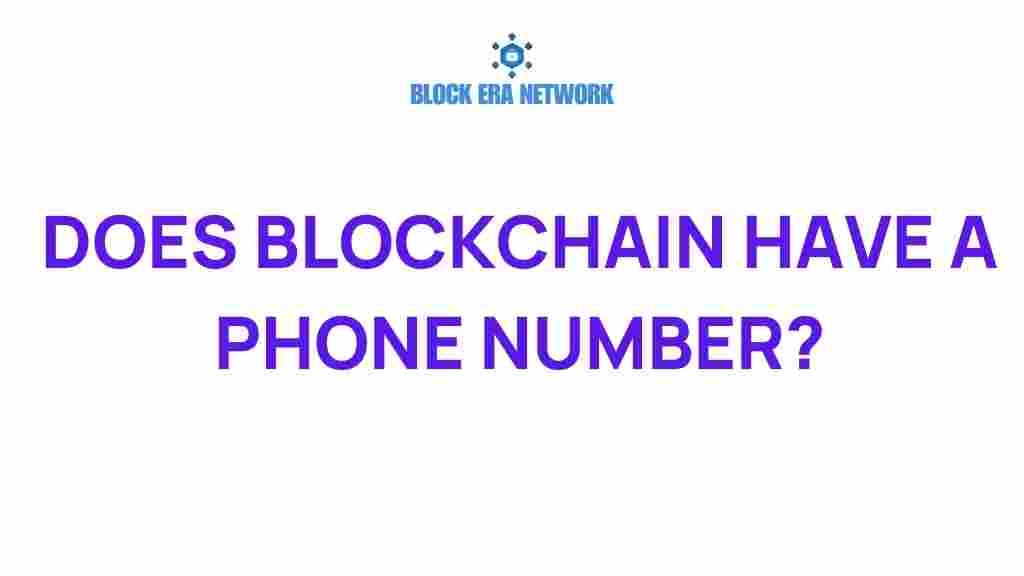Does Blockchain Have a Phone Number? The Surprising Truth Unveiled
In the ever-evolving landscape of technology, one term has captured the imagination of innovators, businesses, and individuals alike: blockchain. As a decentralized ledger system, blockchain is often discussed in the context of cryptocurrencies, but its applications extend far beyond digital currencies. The question, however, remains: does blockchain have a phone number? This article will delve into the fascinating world of blockchain, exploring its implications for communication, connectivity, and digital transformation.
The Essence of Blockchain Technology
To understand whether blockchain has a phone number, we first need to grasp what blockchain technology is. At its core, blockchain is a distributed ledger that records transactions across many computers in such a way that the registered transactions cannot be altered retroactively. This technology is characterized by:
- Decentralization: Unlike traditional databases controlled by a central authority, blockchain operates on a peer-to-peer network.
- Security: Transactions are encrypted, and the consensus mechanism ensures that only valid transactions are recorded.
- Transparency: All participants in the network have access to the same data, which enhances trust.
- Innovation: Blockchain enables new business models and applications, from smart contracts to decentralized finance (DeFi).
Blockchain and Communication
Now that we’ve established what blockchain is, let’s explore its role in communication. Traditional communication systems rely on centralized servers, which can be vulnerable to attacks and failures. Blockchain offers a novel approach:
- Decentralized Communication: By using blockchain, communication can be decentralized, allowing users to exchange messages without relying on a central authority.
- Enhanced Security: Messages sent over a blockchain network can be encrypted, ensuring that only intended recipients can access them.
- Data Integrity: Blockchain can ensure that messages have not been tampered with during transmission, enhancing trust in communications.
Despite these advantages, blockchain does not inherently have a “phone number” in the traditional sense. Each participant in a blockchain network is identified by a unique cryptographic address rather than a phone number. This unique identification system is crucial for maintaining the security and integrity of transactions on the network.
The Role of Blockchain in Digital Transformation
The shift towards a more digital and interconnected world is referred to as digital transformation. Blockchain plays a significant role in this transformation by:
- Facilitating Trust: In an era where trust in institutions is waning, blockchain provides a trustworthy alternative for transactions and data sharing.
- Enabling New Applications: From supply chain management to digital identity verification, blockchain opens new avenues for innovation.
- Connecting Disparate Systems: Blockchain can bridge the gap between various systems, enhancing connectivity across industries.
Understanding Blockchain Networks
Blockchain operates through networks that consist of nodes (computers) that validate and record transactions. Each node has a copy of the entire blockchain, which ensures that the data is consistent and tamper-proof. Here’s how a typical blockchain network functions:
Step-by-Step Process of Blockchain Transactions
- Transaction Creation: A user initiates a transaction, which is then grouped with other transactions into a block.
- Block Verification: Nodes in the network verify the transaction using consensus algorithms.
- Block Addition: Once verified, the block is added to the blockchain, making the transaction permanent.
- Updating Nodes: All nodes update their copies of the blockchain to reflect the new transaction.
Common Issues and Troubleshooting Tips
While blockchain technology offers numerous benefits, users may encounter challenges. Here are some common issues and troubleshooting tips:
- Network Congestion: During peak times, transactions may be delayed. Solution: Consider using a blockchain with lower traffic or wait for off-peak hours.
- High Transaction Fees: Fees can vary based on network demand. Solution: Choose the optimal time for transactions when fees are lower.
- Security Concerns: While blockchain is secure, users must protect their private keys. Solution: Use hardware wallets or secure password management practices.
Exploring the Future of Blockchain Communication
The future of communication powered by blockchain is filled with potential. Innovations such as decentralized applications (dApps) and blockchain-based messaging platforms are emerging. These platforms promise to:
- Enhance Privacy: Users can communicate without their data being stored on a central server.
- Reduce Costs: By eliminating intermediaries, blockchain can lower communication costs.
- Foster Global Connectivity: Blockchain can facilitate communication in regions with limited internet access by using peer-to-peer technology.
Case Studies of Blockchain in Communication
Several companies and projects are already utilizing blockchain to enhance communication:
- Whisper: A decentralized messaging protocol that allows users to send encrypted messages without a central server.
- Matrix: An open standard for decentralized communication that supports real-time messaging and video calls.
- Holochain: A framework for building peer-to-peer applications that can operate independently of centralized servers.
These projects exemplify how blockchain is revolutionizing communication, making it more secure and decentralized.
Conclusion: The Final Thoughts on Blockchain’s Role
In conclusion, the question “Does blockchain have a phone number?” leads us to a broader understanding of how blockchain technology impacts communication and connectivity. While blockchain does not operate through traditional identifiers like phone numbers, it provides a revolutionary way to identify users and secure transactions through cryptographic addresses.
The implications of blockchain for digital transformation are profound, paving the way for enhanced security, decentralization, and innovative applications across various sectors. As we continue to explore the capabilities of blockchain, it is evident that its influence will only grow, reshaping the way we communicate and interact in the digital world.
For more information on blockchain technology and its applications, visit Blockchain.com. To learn about the latest trends in communication technology, check out this resource.
This article is in the category Blockchain Basics and created by Block Era Network Team
